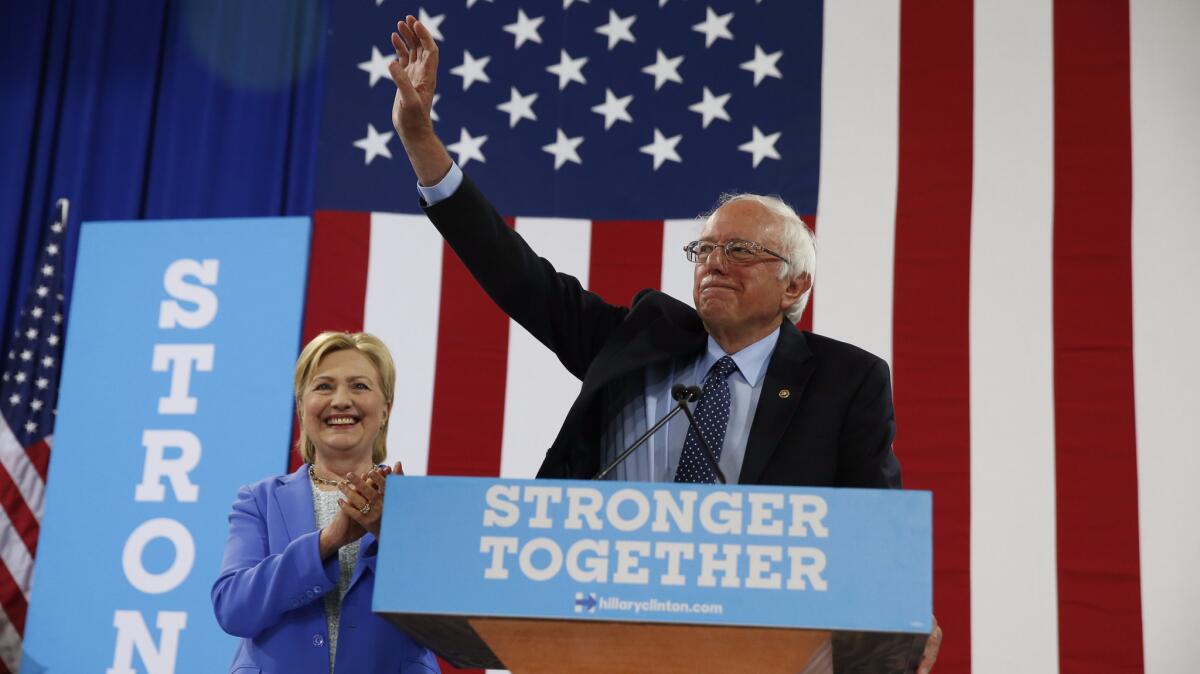What if no one wins a majority of Democratic delegates?

- Share via
For the first time since 1968, Democrats could end their presidential primaries with no candidate taking the majority of delegates needed to win the nomination on the first ballot at their national convention this summer.
That has prompted feverish speculation about a brokered convention, a fantasy long cherished by overexcited political reporters.
But there’s a more likely scenario that’s been overlooked: a bare-knuckle battle for delegates in June and July, well before the Milwaukee convention starts.
Call it the Overtime Primary — or, if you prefer, the Unattached Delegate Primary. If it happens, it could be decisive not only for the nomination, but for the party’s fortunes in the November election as well.
Under party rules, the convention’s first ballot is decided solely by the 3,979 delegates chosen by primaries and caucuses. To win, a candidate needs a majority of those delegates — at least 1,991.
But what if, when the primaries end, none of the candidates has enough? Imagine, for example, that Bernie Sanders has 45%, Joe Biden has 40% and other candidates split the rest.
That’s when the Overtime Primary kicks in. Even before the convention opens on July 13, candidates are free to woo each others’ delegates. And delegates are free to switch, especially if the candidate they originally supported has dropped out of the race.
“From June until the opening of the convention, it’s going to be a madhouse,” Elaine Kamarck, a former aide to Bill Clinton and a member of the party’s rules committee, told me.
“The candidates will call delegates. They’ll call anybody who might influence delegates. They’ll cut deals with labor unions, because union delegates might follow their leaders. They’ll do whatever they can think of,” she predicted — including perhaps dangling a vice presidential nomination.
That’s called politics. But it’s an old-fashioned brand of politics most of us have never seen in real time.
If the top candidate is very close to a majority, he or she can probably get over the top pretty easily. If Sanders or Biden wins 48% of the delegates in the primaries, for example, it shouldn’t be hard to get to 50%.
“But if nobody’s close, you could see a lot of horse-trading,” she told me.
If you listen closely, candidates already are honing their arguments for the Overtime Primary — the pitches they’ll make to delegates who might be swayed.
Biden warns that a Sanders nomination could hurt Democrats’ chances in congressional, gubernatorial and state legislative races — the so-called down-ballot races.
“I can win in places where I don’t think Bernie can win,” he said. “I can bring along Democratic victories up and down the state.”
Sanders, by contrast, argues that whoever wins the most delegates, even if he doesn’t reach a majority, should be the presumptive nominee.
“The will of the people should prevail,” he said.
That’s the opposite of the argument Sanders made in 2016, when Hillary Clinton was in first place and he trailed in second.
It’s also not what the party rules say. The rules, which Sanders helped draft in 2018, say the nominee needs a majority, not just a plurality, of delegates.
“Forty percent at the end of the day is not enough,” Tom Perez, chairman of the Democratic National Committee, said last month.
If the candidate with the most primary votes doesn’t win the nomination, Sanders warned last week, “That would be a very divisive moment for the Democratic Party.”
That’s obviously true; any hard-fought outcome will be divisive. But it also sounds a little like a threat.
In 2016, when Sanders finished behind Clinton in both votes and delegates, Sanders’s campaign manager denounced the process as “rigged,” and many of his delegates walked out of the convention in Philadelphia.
This time, if Biden comes in second in primary votes but then cobbles together a majority of delegates, Sanders supporters will understandably be furious again.
And that’s only the first ballot. It gets worse.
If the first ballot doesn’t produce a nominee, the party’s 775 so-called superdelegates, elected politicians and party leaders, are allowed to vote in later rounds.
The addition of the superdelegates would probably hurt Sanders’ chances, since most of them are more moderate than he is.
Cue another walkout.
“If Bernie loses, even if he loses fair and square, his people will blame the party,” Kamarck said. “They’re doing it already.”
None of these scenarios look appetizing to Democrats who hope to unite for a tough campaign against President Trump. The president is doing his best to stoke the division, warning that Democratic leaders are trying to steal the nomination from Sanders.
History suggests that parties that come out of their conventions deeply divided often do badly in the general election campaign that follows.
So it’s going to matter how the process looks: whether it’s transparent. Whether the winner is gracious in victory, and the loser accepts the outcome without recriminations. If deals are to be cut, better to cut them in the open, not a smoky backroom.
The Democratic convention won’t be contested, strictly speaking, if one of the candidates assembles a majority one way or another before the delegates arrive in Milwaukee.
But it’s almost certain to be angry and divisive — no matter who wins. It could be great political theater, too. That’s all good news for Trump.
More to Read
Get the L.A. Times Politics newsletter
Deeply reported insights into legislation, politics and policy from Sacramento, Washington and beyond. In your inbox twice per week.
You may occasionally receive promotional content from the Los Angeles Times.











